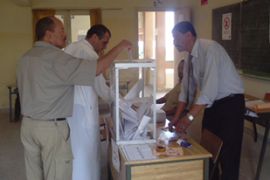Morocco votes in parliamentary poll
Turnout is expected to be low despite weeks of campaigning.

|
“There are no chances of Islamic groups winning as most people in Morocco are enjoying its liberal culture” Nazia, Lahore, Pakistan |
The Islamic Justice and Development Party (JDP) is expected to make gains and undermine power of other progressive, socialist, liberal and conservative parties.
The latest polls predict the JDP will expand its representation in parliament from 42 of the 325 seats to 70 or more.
The party is particularly popular among the poor in many of the country’s marginalised communities. It says it will tackle corruption.
Due to the diversity of political parties in the country, it is unlikely that a single party will win a single majority, so the country will be governed by a coalition.
Polling will take place at 7,380 voting offices across the country. The polls will close at 7pm and results are expected on Sunday.
A new government will be formed after several weeks of talks between political parties and palace officials.
Boycott
Two parties are boycotting the polls, the Democratic Path (Annahj Addimocrati) and the Amazigh Democratic party (Al-hizb addimocrati al-Amazighi).
|
Elections 2007 | ||
A series of special reports |
The Democratic Path, founded in 1995, has never taken part in an election, arguing that political life has not witnessed changes and that parliament has no real legislative power. The king still selects the country’s prime minister.
The Amazigh Democratic party says the it boycotts the elections because of “the lack of recognition of Amazigh identity and the Amazigh language in the constitution, as well as the state’s continuing strategic marginalization of Amazigh concerns”.
Turnout
Despite widespread awareness campaigns educating citizens on the importance of voting, the authorities anticipate that slightly more than half of the three million new electorates have registered to vote.
The government adopted new electronic methods to encourage voter registration and set up a special internet site (www.elections.gov.ma) where citizens could find answers to common questions about the registration and voting process.
The country’s ministry of interior has allowed voters to register by sending their national ID card number and date of birth by SMS to a toll-free phone number.
Some Moroccan newspapers have highlighted cases of fraud such as handing out cash advances to voters ahead of the polls – accusing some political parties of intimidation.
Election fund
Most of the main political parties competing in this year’s elections are learning from past mistakes and campaigning for job creation and tangible economic growth.
The Moroccan government has allocated $61m to fund organising the current legislative elections, which are Morocco‘s eighth, and the second since the ascension of King Mohammed VI to the throne in 1999.
The elections are also the first in Morocco since the parliament approved the new political parties’ law in October 2005, which aimed at reforming political life and increasing transparency.
For the first time in modern Moroccan history, an international group of 43 multinational observers have been granted the right to monitor the elections under the supervision of the United States‘ National Democratic Institute.
The Moroccan Consultative Council for Human Rights has also been officially entrusted with supervising and co-ordinating the monitoring effort.
